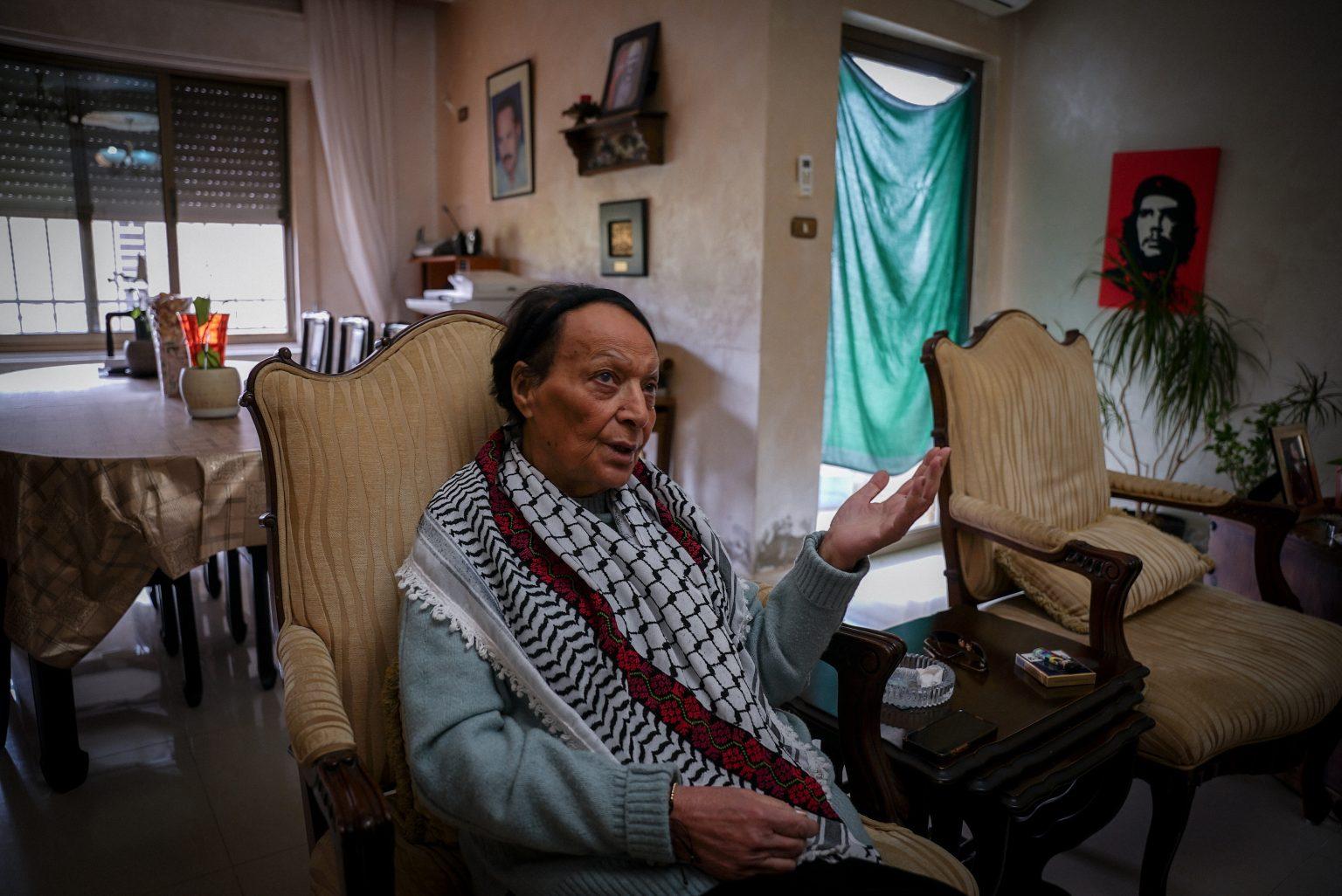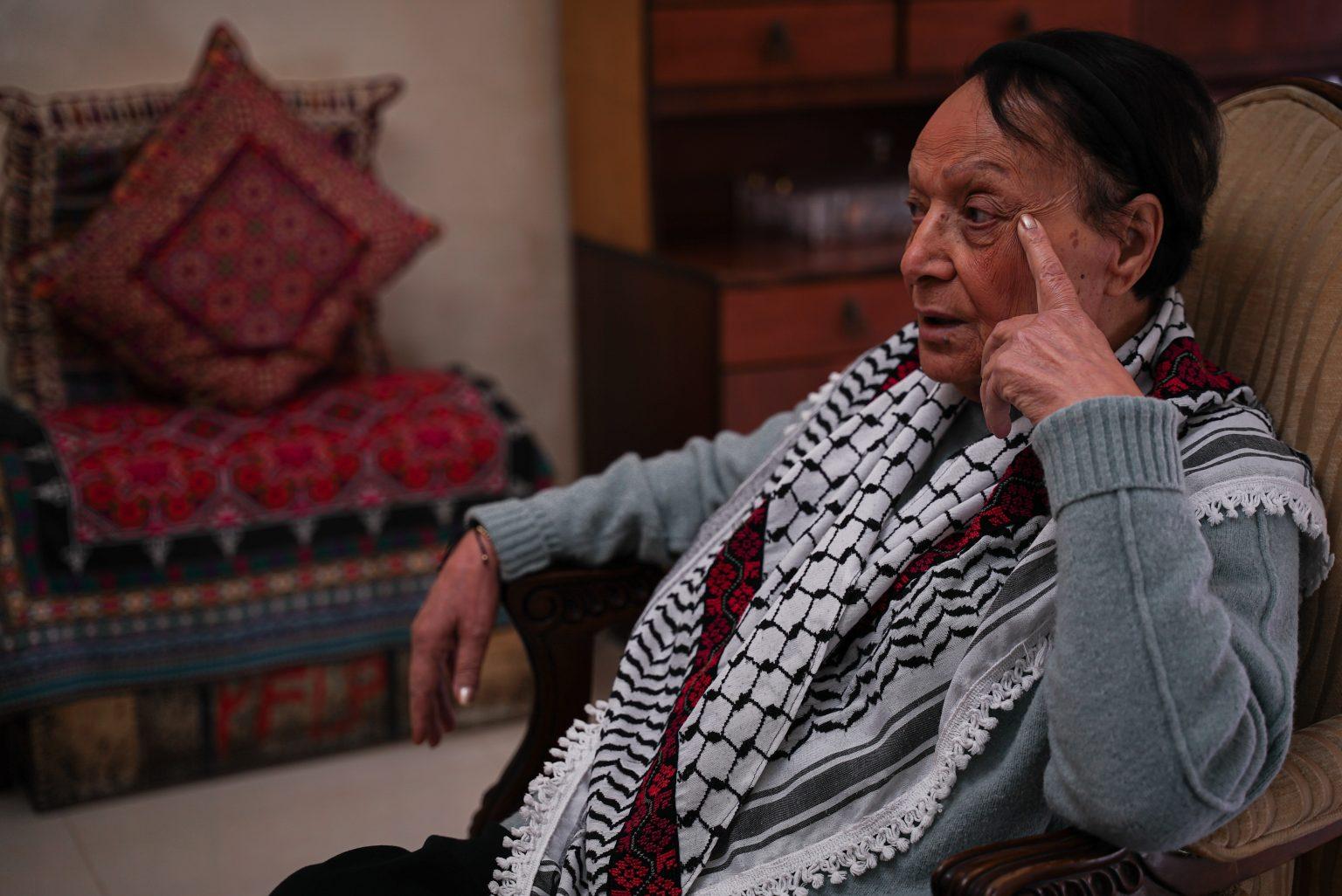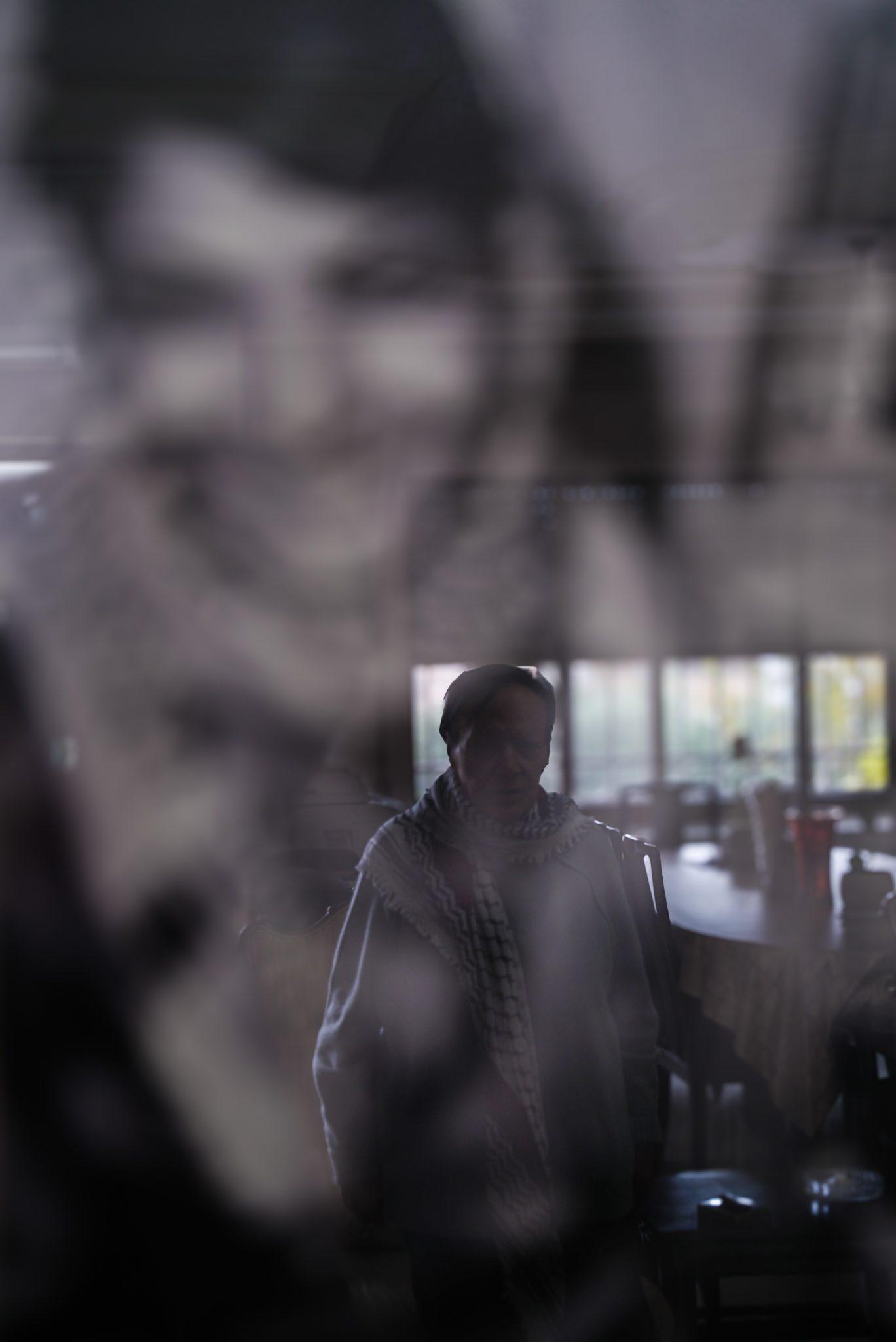
Leila Khaled, 80 years old, has been fighting for the liberation of Palestine since she was fourteen. She grew up as a refugee in Lebanon and joined the resistance at a young age. She is a well-known freedom fighter in the Palestinian movement, especially known for being the first woman to hijack a plane in 1969. Khaled did most of her resistance work with the Popular Front for the Liberation of Palestine (PFLP), moving between countries to pursue her cause, until she settled in Jordan after getting married in 1992. When Mondoweiss met her in Amman, she had just returned from Venezuela, where she attended a conference on Palestine – her work for liberation is still ongoing.
Mondoweiss: You joined the Arab Nationalist Movement, which the Popular Front for the Liberation of Palestine (PFLP) later derived from, when you were 14 years old. Why did you decide to join them?
The feeling of deprivation and injustice makes you take a stance: either you accept it or you reject it. I rejected it. Since I was young, we were deprived of things that were once available to us in Palestine. When we arrived in Lebanon, we saw people who had been displaced, walking from Palestine to Lebanon, each one carrying their children or belongings, and everyone was crying, men, women, and my mother was crying too, and so were we. We arrived at my uncle’s house and around it, there were orange trees. We wanted to eat them, but my mother said no: “This is not yours. what is yours, is in Haifa, in Palestine. We do not have anything here.”
This made me dislike oranges for years. It was not ours, all we had was in Palestine. I did not eat an orange until 1970. The situation was so depressing, and people in Lebanon were feeling with us, they opened their homes for us. We, the children, were always asking why we were not in Palestine. Once you grow up, you start understanding more. What we went through would have affected any human being. If we understand a little bit, we will ask questions, and they have answers. These were all ways for me to start thinking about how we could go back home. You will start asking yourself and those around you “What can we do?” I was 14 years old when I decided to join PFLP, then called the Arab National Movement (ANM). My brothers joined before me, and I followed after them.
The past year, thousands of people all over the world have taken to the streets to protest the occupation of Palestine and the ongoing American-Israeli genocide. As someone who has dedicated their life to the Palestinian cause, what do you think about the growth of the Palestine movement over the past year?
I have been realizing that the world has started to wake up. The Palestinian struggle has lasted for more than 75 years and now people are starting to learn about it. We have already gone through phases of revolution and then the Intifada, which raised global awareness about our cause. Yet, Israel still refuses to commit to anything and America protects them with the VETO. Biden recently stated that you don’t have to be Jewish to be a Zionist and that he himself is a Zionist. He also said that “If Israel didn’t exist, we would have to create Israel.” This clearly shows his support for genocide. He has repeatedly emphasized that the U.S. will continue to support Israel with all forms of assistance. In fact, they’ve provided Israel with the most advanced weapons to test on Gaza. For instance, the phenomenon of bodies vaporizing under bombardment, where else has this happened before? They are using the most horrific and brutal weapons in history to wipe out the Palestinian people. What is happening now is genocide, and people have been demonstrating against it and apartheid.

Leila Khaled in her apartment in Amman, Jordan. (Photo: Bayan Abu Ta’ema)Leila Khaled in her apartment in Amman, Jordan. (Photo: Bayan Abu Ta’ema)
This generation has become more aware of the Palestinian situation and the cause. This is partly because of social media. I mean that the new generation must search for the facts about the struggle. The thousands of people who have gone out on the streets and the student movements are proof that they have understood the cause. It is also proof that they stopped believing the biggest lie: that Palestine was a land without people and that Palestinians are a people without a land. The reality is that it is our duty to work on building information networks. We have to fight with the world to inform them about the struggle. Western media have their politics, which is built upon their own opinion, that is clear. They are not with the people’s movement. This year, I went to Malaysia, Nicaragua, and Venezuela for conferences on Palestine.
What are your thoughts on October 7th and the historical background for the Al Aqsa Flood?
The 7th of October was a must, it had to happen because the history of the struggle is long between us and the enemy. Until when were we supposed to stay like this, living under occupation? This is a big question. Until when? This was not a military operation, it was a historical operation. It showed you our struggle, our victims, the occupation, and all of the policies that the occupation is putting upon our people, whether it is in the West Bank, in Gaza, or even outside (of Palestine). It showed you that we had to make a drastic change.
The importance of the (Palestinian) struggle was proved to the world. The occupation has lasted for over 75 years, why did people start demonstrating now? People far away, even in Australia and Iceland, have been demonstrating, but it is not a question of distance: it is about how people became aware of the truth of the struggle. And the truth is in the facts. We are now in the age of social media. People see the images, and even if Israel’s supporters shadowban posts, they cannot silence the movement on the streets. People started demonstrating, and the student movement has been astonishing.
The operation happened, and the world understood why. America and Israel tried to twist the truth and say that they are terrorists, but who is the real terrorist? Until now, America has prevented any conference to define terrorism. They (America and Israel) don’t want to determine what terrorism is, because they are the terrorists themselves. What is the occupier? The one who occupies is a terrorist.
Massacres have been committed all around the world, but something like what’s happening in Gaza? No, it hasn’t happened. Israel has been exposed as a racist, occupying state, and this has led people to raise slogans against apartheid and racism. These terms have now become widely used in the streets.
The Western countries work against each other but consider the Zionist movement as a reference point. This means that Israel is heavily supported because it was founded by the Zionist movement.. All these issues are interconnected, and now we are seeing how Israel is a state that doesn’t abide by international or humanitarian laws. And yet it is protected by the West, which consists of former colonizers in our region, meaning they are still unable to admit that this entity must be isolated.
In 1969, you participated in a flight hijacking with PFLP. Can you tell us more about why you decided to take part in it?
This was not my idea, I was the one who carried out the task at that time. I was studying in Kuwait and went back to Lebanon in 1968 for a trip to see Dr. Wadie Haddad, the leader of PFLP. I told him I wanted to go to Jordan to train, but he said no. I told him I had been waiting for the revolution to start so that I could participate. I wanted to carry a weapon, resist, fight, and liberate Palestine. That was my dream.

Leila Khaled’s image reflects in a photo of herself taken after returning to Jordan following the hijacking of TWA Flight 840 in 1969. (Photo: Bayan Abu Ta’ema)Leila Khaled’s image reflects in an iconic photo of herself taken after returning to Jordan following the hijacking of TWA Flight 840 in 1969. (Photo: Bayan Abu Ta’ema)
My mother did not want me to go, but my father told her “When we fled Palestine, the women left first. When we want to go back, the women will also be the first.” So I took my siblings and went to the military training camps.
When PFLP was established, two slogans were set forth. The first one was that women and men are together in the fight for liberation, which means that women must be part of the military training camps. The second one is “Behind the enemy everywhere.” Why? Because the PFLP believes that the enemy is not just Israel but the Zionist movement, which has worked and continues to work to seize this land and drive us out of it. The PFLP believes in targeting the enemy’s interests wherever they are in the world, as this is a fundamental part of the main battle that includes carrying arms against the enemy in Palestine.
In 1969, Wadie Haddad asked me if I was ready to die, and I said yes. He then asked if I was ready for imprisonment, to which I said that we entered this path knowing the risks and there are already many of our Palestinian comrades in prisons due to military operations. I understood what it meant to be imprisoned by the occupation.
Then he went on to ask me if I was ready to hijack a plane. I was surprised, I had not heard about hijacking before, and I was 24 years old. So I took some time to consider it, thinking about why we were going to do it. The goal was to release all the Palestinian prisoners that were imprisoned by Israel. I was so happy I was going to do something for Palestine. We took the plane from Rome, it came from America. It was supposed to go to Athens, then Tel Aviv. But as Arabs, we could not go to Tel Aviv, so we ordered tickets to Athens.
We knew that the plane was American and that it carried weapons that were going to Israel. We changed the plane’s code to “The Popular Front for the Liberation of Palestine, Palestine is Free and Arab,” and anyone who wanted to communicate with us had to use this code. I told the captain to give us a tour for us to see Palestine. It was the first time I saw Palestine after we fled. I was thinking of my father, who had passed away. The pilot told me that I had to put my arm on my shoulder. He was scared because I was holding an open bomb in my hand. I told him “do not be scared, I have trained for this.”
I gave him a new map, leading us to Damascus, and we went there. We blew up the cockpit when the passengers had left – we wanted to ruin the plane. We were happy because when the police arrived, they thought we were some of the passengers. I told the police: “Look at the Israelis, they fled.” We were in Syria for one and a half months, first with the secret police, but then they let us go. They gave us a house to stay in and took us out at night to show us Damascus and they took us to restaurants.
What do you see as the way forward to reach a liberated Palestine?
We agree – as the Palestinian resistance, not just Hamas but all fighters who carry weapons – that we do not have options or the luxury of choice. We have one path, and it leads to Palestine: armed resistance. Of course, politics, popular peoples movements, and diplomatic work helps. But the most important is the weapons, and the core is to hit the enemy directly on the land it occupies. It is our right as a people who are living under an occupation to resist with arms. This is written in international law. There is always hope for liberation. If there were no hope, we wouldn’t have fought at all.
My message to the world is that we Palestinians are part of this world, and we are being oppressed. This war that is happening is a genocidal onslaught, until when will it last? 2.5 million people are living in the Gaza Strip, do they want to kill them all?
The international court says that it is the court of justice, when will it decide that this is really a genocide? How many Palestinians have to be killed before they reach a decision?
Every country, alongside with the United Nations, must push for their governments to cut ties with Israel. Israel is an apartheid state. Everyone, not just the people but also the states, must boycott the occupation. The new generation is playing a very important role in the fight for liberation, and I want to tell you to not stop – continue going down this road.